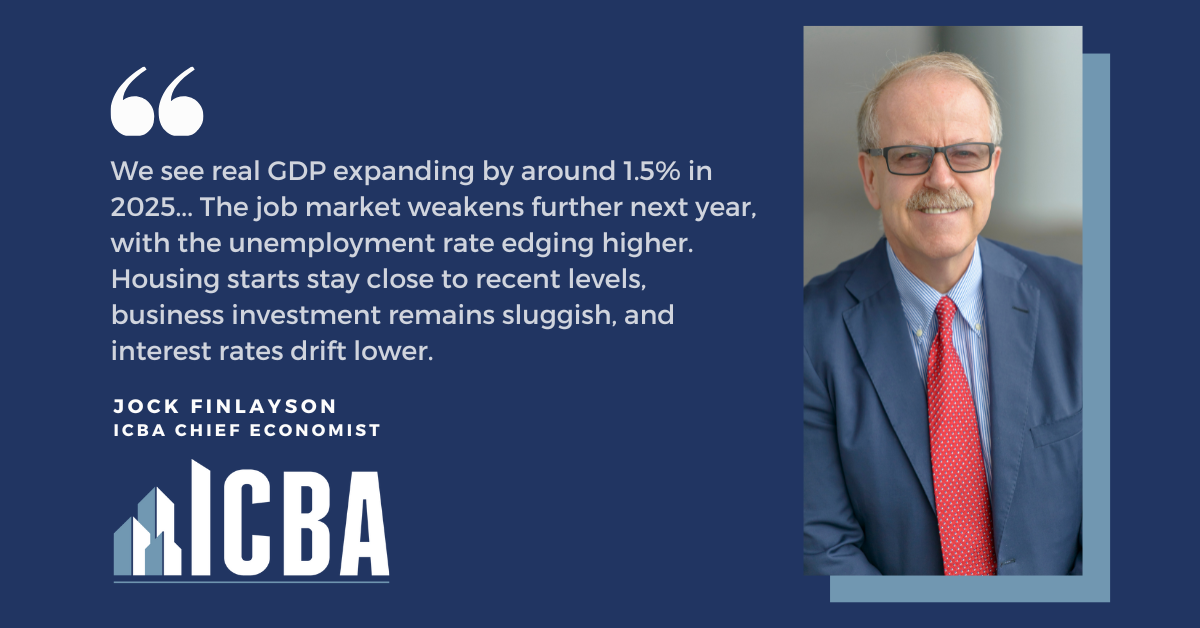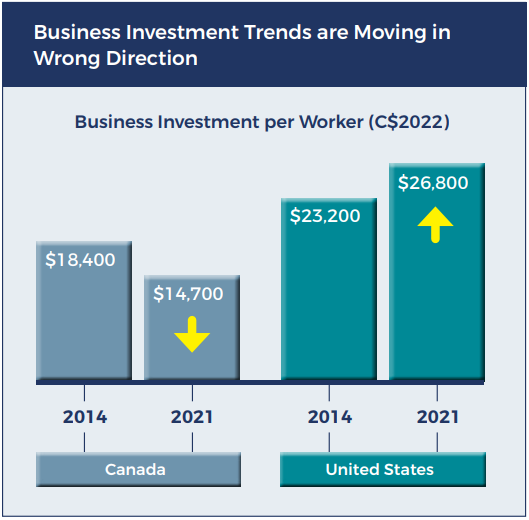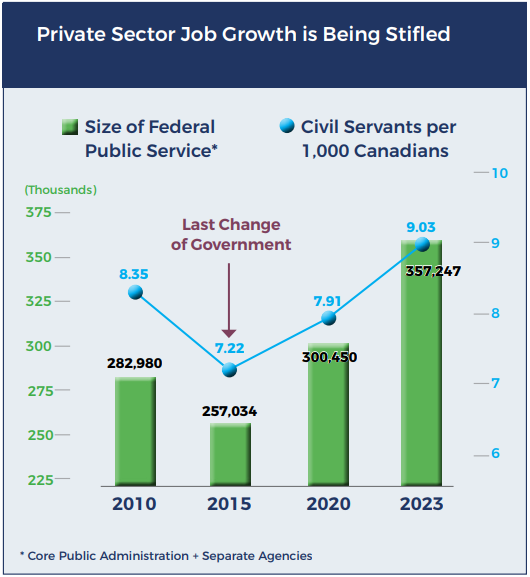
ICBA Chief Economist Jock Finlayson researches and analyzes the vital economic data you need to know to grow your construction business.
Jock's Top Story
As a new year beckons, Canadian policymakers and business leaders find themselves staring at an unsettled economic landscape that renders the task of forecasting more perilous than usual.
The past two years have been underwhelming for Canada’s $3 trillion national economy. Growth in inflation-adjusted gross domestic product (GDP) has lagged well behind the country’s surging population, leading to serial declines in real GDP per person – the most common measure of prosperity. In fact, on a per person basis Canada arguably has been in a recession since the end of 2022, even though top-line economic growth has remained modestly positive. Business investment – an area of chronic weakness under the Justin Trudeau government – has continued to languish. Housing starts have failed to gain traction, despite the unprecedented policy attention being lavished on Canada’s housing supply and affordability crisis. Meanwhile, productivity – the principal driver of long-run gains in real wages and incomes – has been going backwards, with Canada’s shortfall relative to the U.S. on labour productivity (GDP per hour) reaching record levels.

What Mike and Jock are reading:



RBC’s Thought Leadership Group offers seven ways to fix Canada’s housing shortage. Lots of great ideas in here, including getting government out of the way by cutting taxes and expensive red tape.
ICBA Alberta's Construction Monitor
June 2024
We pride ourselves in Alberta on our capacity to create businesses and industries, and to provide much of the foundation of our national economy. Certainly we see that drive and delivery in our construction sector.
But the hard fact remains that Canada as a whole is experiencing a long, slow decline. On productivity growth and other key measures of well-being and competitiveness, we are increasingly coming up short among our global peers and competitors. The alarm bells are ringing louder, with many commentators calling on government and industry to re-double efforts to generate productivity growth. It’s in all our interests since, as a Bank of Canada official recently put it: “Ultimately, higher productivity helps the economy generate more wealth for
everyone.”
So what’s behind our dismal growth performance? According to the OECD, business investment in Canada from 2015 to 2023 ranked 44 out of the 47 most advanced economies. And last year the C.D. Howe Institute reported that for every dollar an American business spends on training, technology and
capital – essential ingredients of innovation – a Canadian company invests 58 cents.
Investment capital is also being taxed and regulated away, and opportunities missed. Canada has a huge competitive advantage in highly in-demand natural resources, as we well know in Alberta. But visiting leaders from Germany, Greece, Japan and Poland have recently received a cold shoulder from Ottawa at the suggestion that Canada supply them with much-needed energy.
Small wonder that private sector job creation in Canada has often been weak
while the size of government has ballooned.
We need governments at all levels willing to harness our talent, ambition and resources to grow our economy. And with about 20 per cent of construction workers expected to retire over the next five years, innovation and labour productivity need to be especially front and centre for contractors.
Fortunately, technology and innovation are changing and improving the way we
design and build buildings. That will help meet the need to get more housing and infrastructure in place fast and efficiently. What we also need, however, is an economy-wide focus on enabling and driving productivity growth.


How to Join
To join, click on the “Apply Now” button below and fill out the online membership form. We will review and process your application within one business day.
If you have any questions or require assistance,
please contact our Member Services Team at 1.800.663.5384 or 587.315.3319
About Jock Finlayson
Jock Finlayson is Chief Economist for the Independent Contractors and Businesses Association (ICBA), Canada’s largest construction association. He is the first Chief Economist in ICBA’s 50-year history. Analyzing industry trends, market conditions, and economic factors to provide insights and forecasts relevant to the construction sector, he advises ICBA and its members on developments in the business and policy environment affecting the construction sector and the broader economy and assists in strategic planning and public policy advocacy.
Previously, Mr. Finlayson served as Executive Vice President and Chief Policy Officer at the Business Council of British Columbia. In that capacity, he directed the Business Council’s work on economic, fiscal, tax, environmental, regulatory, and human capital issues of interest to the largest employers in the province and the wider business community.
Prior to returning to B.C. in 1994, Mr. Finlayson was Vice President of Research at the Business Council of Canada, a leading business association in Ottawa.
Mr. Finlayson holds a master’s degree in business from Yale University, undergraduate and M.A. degrees from UBC, and an honorary Doctor of Laws from Royal Roads University.
He is the author/coauthor of two books and more than 50 published articles, book chapters and monographs. A frequent commentator on economic, business, and public policy issues, Mr. Finlayson writes regularly for Business in Vancouver, the Globe and Mail, The Orca, Black Press, Troy Media, and Postmedia.
From 2007 to 2013, Mr. Finlayson was a member of the Board of Directors of the Bank of Canada, where he chaired the Corporate Governance Committee and the Fellowship Committee and served on both the Pension Committee and the Human Resources Committee. He is a past member of the National Statistics Council, the principal advisory body to the Chief Statistician of Canada, and previously sat on the Boards of the Institute for Research on Public Policy, the Canada West Foundation, and Genome BC. From 2019 to 2021, he was a member of the Expert Panel on Housing Supply and Affordability jointly appointed by the B.C. and federal governments.
Mr. Finlayson is a Senior Fellow at the Fraser Institute, a Fellow of Royal Roads University, and past president of both the Association of Professional Economists of B.C. and the Ottawa Economics Association. He resides in West Vancouver with his wife Marlene.

